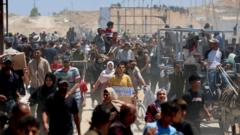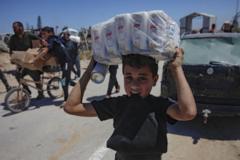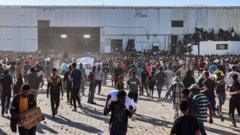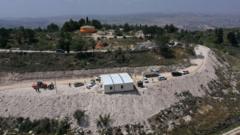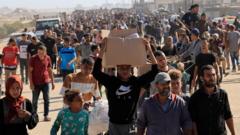As the war continues, Israel faces backlash over civilian casualties and the humanitarian crisis while emphasizing achievements against Hamas.
**Israel's PM Declares Death of Hamas Chief Mohammed Sinwar Amid Ongoing Conflict**

**Israel's PM Declares Death of Hamas Chief Mohammed Sinwar Amid Ongoing Conflict**
Amidst the ongoing Israel-Gaza conflict, Prime Minister Benjamin Netanyahu announces the elimination of Hamas's chief in Gaza, Mohammed Sinwar, following a deadly airstrike.
In a significant development during the prolonged Israel-Gaza conflict, Prime Minister Benjamin Netanyahu announced the death of Mohammed Sinwar, the chief of Hamas in Gaza and the brother of the organization's late leader, Yahya Sinwar. Netanyahu stated that Sinwar was "eliminated" in a recent airstrike aimed at dismantling Hamas's operational infrastructure. The Israeli military reported that on May 13, they targeted a courtyard near the European hospital in Khan Younis, leading to the collapse of underground facilities purportedly used by Hamas.
The strike reportedly resulted in the deaths of 28 individuals, as confirmed by Gaza's Hamas-run Civil Defence agency, although Hamas has neither confirmed nor denied Sinwar's death. This military action continues a broader Israeli campaign initiated after Hamas's unprecedented cross-border attack 600 days ago, which caused approximately 1,200 fatalities and left 251 hostages taken.
Since the conflict escalated, more than 54,000 people have reportedly died in Gaza, according to health ministry figures. Netanyahu also addressed ongoing concerns regarding the hostages held by Hamas, asserting that 20 are confirmed alive while others are feared dead. Criticism from opposition members in parliament prompted Netanyahu to defend the military’s actions, insisting they had successfully altered the regional landscape and achieved strategic objectives against Hamas.
Sinwar, who joined Hamas shortly after its inception in the late 1980s, ascended through the ranks and became an influential figure within the organization, involved in significant acts of aggression against Israel. During the parliamentary session, Netanyahu emphasized the military's accomplishments, including others targeted in recent operations, calling for national unity against Hamas.
The Israeli government has faced scrutiny over its military strategy, particularly the high civilian toll in Gaza. The UN has expressed deep concerns regarding civilian casualties, with human rights advocates urging compliance with international humanitarian law. Concurrently, Netanyahu announced a new aid distribution approach in Gaza, managed by a US-backed foundation, which has drawn criticism for bypassing established humanitarian protocols.
As the situation unfolds, calls for a resolution and the return of hostages intensify, with families of those missing pushing for comprehensive national victory as Israel navigates through a challenging humanitarian crisis and conflict dynamics.
The strike reportedly resulted in the deaths of 28 individuals, as confirmed by Gaza's Hamas-run Civil Defence agency, although Hamas has neither confirmed nor denied Sinwar's death. This military action continues a broader Israeli campaign initiated after Hamas's unprecedented cross-border attack 600 days ago, which caused approximately 1,200 fatalities and left 251 hostages taken.
Since the conflict escalated, more than 54,000 people have reportedly died in Gaza, according to health ministry figures. Netanyahu also addressed ongoing concerns regarding the hostages held by Hamas, asserting that 20 are confirmed alive while others are feared dead. Criticism from opposition members in parliament prompted Netanyahu to defend the military’s actions, insisting they had successfully altered the regional landscape and achieved strategic objectives against Hamas.
Sinwar, who joined Hamas shortly after its inception in the late 1980s, ascended through the ranks and became an influential figure within the organization, involved in significant acts of aggression against Israel. During the parliamentary session, Netanyahu emphasized the military's accomplishments, including others targeted in recent operations, calling for national unity against Hamas.
The Israeli government has faced scrutiny over its military strategy, particularly the high civilian toll in Gaza. The UN has expressed deep concerns regarding civilian casualties, with human rights advocates urging compliance with international humanitarian law. Concurrently, Netanyahu announced a new aid distribution approach in Gaza, managed by a US-backed foundation, which has drawn criticism for bypassing established humanitarian protocols.
As the situation unfolds, calls for a resolution and the return of hostages intensify, with families of those missing pushing for comprehensive national victory as Israel navigates through a challenging humanitarian crisis and conflict dynamics.




